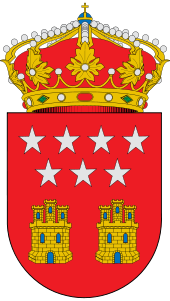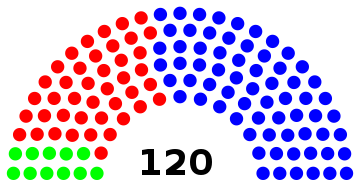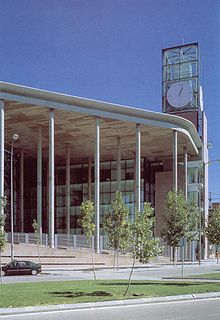- Madrid Assembly
-
Asamblea de Madrid
Madrid Assembly
Type Type Regional Legislature Houses Unicameral Leadership President Elvira Rodríguez, PP
since 12 June 2007Members 120 Elections Last election 27 May 2007 Meeting place Asamblea de Madrid Building in Vallecas, Plaza de la Asamblea, Madrid Website www.asambleamadrid.es Coordinates: 40°22′55.15″N 3°39′44.29″W / 40.3819861°N 3.6623028°W The Madrid Assembly (Spanish: Asamblea de Madrid) is the unicameral regional legislature of the Autonomous Community of Madrid since the approval of the Madrid Charter of Autonomy in 1983.
It is elected every four years during the Spanish Regional and Municipal elections, as the Community of Madrid Charter of Autonomy does not recognise the right to call early elections (as in the Basque Country, Catalonia, Galicia and Andalusia), save for exceptional situations like the scandal that deadlocked the May 2003 Assembly and forced fresh elections in October 2003. According to the Charter, the Assembly is empowered to draw the Madrid Regional legislation, to control the Regional Government's actions and to elect the President of the Community of Madrid.
The Assembly meets in a purpose-built assembly hall in the district of Vallecas of Madrid inaugurated in 1998 specifically designed to host the Madrid Assembly.
Contents
Membership
The legislature is currently (as of 2009[update]) made up of 120 deputies, elected all at once in closed party lists for terms of 4 years. Seats are allocated using the proportional D'Hondt method in one constituency, which makes the Madrid Assembly one of the biggest parliaments in the world with one only constituency. In 2007, this fact moved President Esperanza Aguirre to propose splitting the Community of Madrid into twelve constituencies[1] of 9 to 15 AMs each. The alleged benefit was increasing the contact between statesmen and their electors, but the reform was rejected by the rest of parties in the Assembly on the grounds that it was not a pressing matter, and it would alter the composition of the assembly in favour of the most voted party. Eventually, the proposal was abandoned even though President Aguirre had the majority to pass it through the Assembly, because it would be defeated in the Cortes Generales as it had to be done through a process of reform of the Charter of Autonomy.
Parties that obtain more than 5AMs can form a parliamentary group, in order to organise and participate in the debates and committees of the assembly. Parties that do not reach that number of seats will be part of the mixed group. Currently the threshold for obtaining seats in the Madrid Assembly is 5% of the total votes cast including votes "en blanco" i.e. for "none of the above", thus making it mathematically impossible for a party to obtain less than five seats.
Currently three parties are represented in the Assembly: the People's Party, the Spanish Socialist Workers Party and United Left all of which have their own parliamentary group. The last elections were held on 27 May 2007, and the result was as follows:
 The current Assembly was elected in 2007, and will serve until 2011. The People's Party holds a 14-seat majority
The current Assembly was elected in 2007, and will serve until 2011. The People's Party holds a 14-seat majoritySummary of the results of the last regional election (May 27, 2007)[2] Party Votes Vote % Seats Seats % People's Party (PP) - Current government 1,592,162 53.1% 67 55.8% Socialist Party of Madrid - Spanish Socialist Workers' Party (PSM-PSOE) 1,002,862 33.4% 42 35.0% United Left (IU) 264,782 8.8% 11 9.2% Others/blank/invalid votes 141.294 4.7% 0 0% Turnout / Totals 3,001,200 67.3% 120 100% Leadership
The Madrid Assembly's Leadership resides in the Bureau of the Assembly made out of a President (Speaker), three Vice Presidents who chair debate when the President is absent, and three Secretaries, elected in the first session of each newly elected Assembly. The Bureau is tasked with managing the Assembly schedule and interpreting its rules of order, even with the power to expel disrupting members from the sessions. Currently all parties are represented in the Bureau, which as of 2009[update] is dominated by the ruling People's Party.
Composition of the Bureau of the Madrid Assembly for the 8th term Position Name Party President (Speaker) Elvira Rodríguez PP 1st Vice President María Cristina Cifuentes PP 2nd Vice President Francisco Cabaco PSM-PSOE 3rd Vice President Antero Ruiz IU 1st Secretary Rosa María Posada PP 2nd Secretary María Helena Almazán PSM-PSOE 3rd Secretary Jacobo Beltrán PP There is also a second, consultative body, the Spokespersons' Council (Spanish: Junta de Portavoces), which is made up of the leaders and spokespersons from each parliamentary group[3] in the Assembly and has the right to be "heard"[4] before the Bureau takes some decisions such as scheduling debates and votes. In the Spanish system, however, ruling parties usually do not hold a tight grip over the Parliament's schedule, nor do they use it to turn down the opposition proposals without debate: they are just voted down in committee or by the full house after the shortest debate allowed by the rules of order. Thus, while control of the Bureau and the Spokespersons' Council is definitely important, it is not a critical matter as it sometimes becomes in other systems.
Committees
The Assembly organises its work in different committees. Committees are constituted by the bureau of the Assembly on the advice of the Spokespersons' Council. The number and grouping of its members is also determined at the same time. The election of the membership of the committees is a role of the parliamentary groups that have to be always represented in the committees. The committees are directed by a Bureau composed of a Chair, a vice-chair and a secretary and each group is to designate a Spokesperson and an adjutant spokesperson for the committee, that will usually take care of that matters also in the plenary. For the current term committees are composed of 18 members distributed the following way: PP 10, PSOE 6, IU 2 or of 9 distributed in an equal way.
See also
- List of Presidents of the Madrid Assembly
References
- ^ (Spanish) "El Ejecutivo de Aguirre insiste en dividir la región en 12 circunscripciones electorales, frente a la única actual". El País. 2007-06-15. http://www.elpais.com/articulo/madrid/Ejecutivo/Aguirre/insiste/dividir/region/circunscripciones/electorales/frente/unica/actual/elpepuespmad/20070615elpmad_6/Tes. Retrieved 2007-06-15.
- ^ Source: (Spanish) Madrid Statistics Institute
- ^ Each representative's vote counts as the full power of his/her parliamentary group, so the majority of the ruling party or coalition can't be overturned by a more numerous (in terms of parliamentary groups) opposition.
- ^ Literally, in the Spanish legal jargon, some decisions are to be taken "oída la Junta de Portavoces", that is, "having heard the Spokespersons' Council's opinion".
External links
- Official site of the Madrid Assembly - In Spanish by default, also has an English version
Categories:- Legislatures of the Spanish Autonomous Communities
- Community of Madrid
- Unicameral legislatures
Wikimedia Foundation. 2010.

